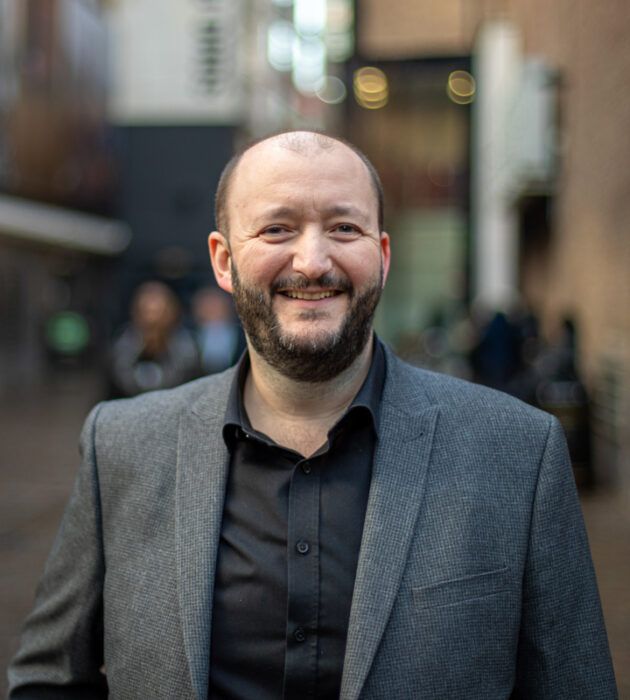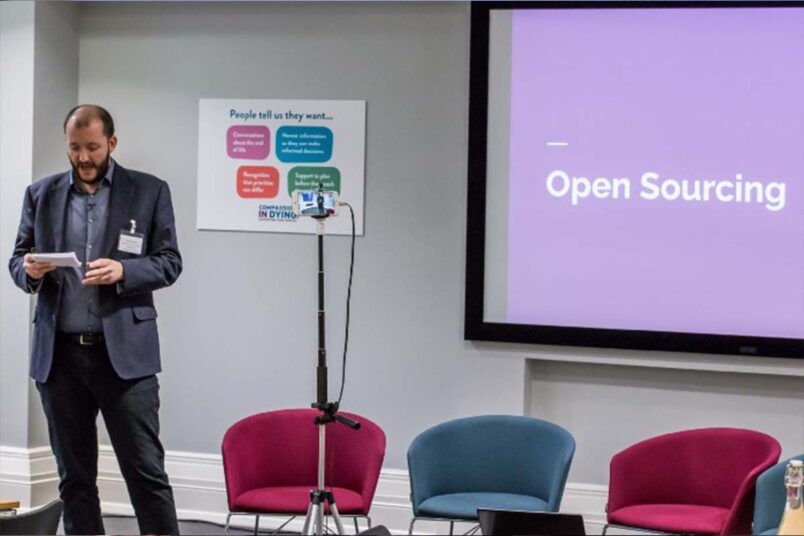
How opening up resources is helping us deliver our mission

As Compassion in Dying’s Director of Marketing, typically I work on our digital projects. I’m used to building things, creating things, working with our service users to to augment our existing services to better meet their needs. However, last year we began testing a new initiative, something a bit different to the work I normally do for Compassion in Dying.
Our new open sourcing project is more about removing things and relinquishing control. It’s about giving up ownership of some of the things that we’ve developed.
We’ve given others permission to use our resources via a Creative Commons license. This means organisations can change the branding on our materials to look like their materials. So, if you were to use one of our factsheets where you work, the words would remain the same but the logo, the colours and the things that might need to change to make it fit into another setting might be different.
Why we’re doing this
I’ll explain more about what we’ve been doing in a minute, but the most important thing is why we’re doing it. Why would a charity give away the materials that it spent so much time and effort developing?
Well — there are there are a few very good reasons.
Firstly, it’s to help other charities and service providers — so they don’t have to reinvent the wheel or duplicate work simply because they need a resource to be ‘theirs’. End-of-life might be a small part of their work, but it’s an area where we focus on a lot, so why not help them by just giving them what we’ve done and put their logo on it?
Secondly, we’re responding to feedback we get from some of the communities we work with. We’ve supported people in a range of different community settings, from Somali women to Portuguese speaking people. We’ve found that, for some people in those communities, they’re more than happy to engage with our services, but prefer to start making an advance statement by thinking about their priorities and spiritual needs. Whilst they’re very able to consider what they might want at the end of life, but they were really quite put off by the word dying. So, for them, why not just be able to remove it?
There’s no need for our logo to be on a resource if a word in our logo is a barrier — if it’s a barrier then it doesn’t need to be there. Some initiatives have their own brands that local clinicians and service users are familiar with, why not integrate our resources into that system if doing so makes it easier for people to start those important conversations?
Essentially we’re open opening up our materials to help us deliver our core purpose — to get more people to plan for the end of their life. It’s more important that people do that than for us to be seen to be helping them. It’s about mission focus, getting our core purpose done as quickly and efficiently as possible.
What we’ve done
To start we took things slowly, while we figured out how well this idea would work. We chose a relatively restrictive Creative Commons license. Under the license we chose you can’t adapt the work without permission and you can’t use it for commercial purposes. The reason we chose this is not because we want to totally stop people adapting things, it’s more of a safeguard. For example, an Advance Decision to Refuse Treatment has to be witnessed properly and it has to have certain wording for it to be ‘valid and applicable’ (i.e. legally binding). We wouldn’t want anyone to accidentally change that and it not to work in practice. We can and will adapt it, but this needs to be done in collaboration so we can make sure that it still works effectively.
We also decided to pilot this idea with a few fact sheets and resources, and we limited it to printed materials in the first instance. So that we could test the principle quickly and simply without wasting any precious charity resource.
How it’s going
We had an early success with this project. Jersey recently enacted mental capacity legislation, similar to our Mental Capacity Act in many ways. As part of that process they wanted to recommend to the citizens of Jersey an Advanced Decision to Refuse Treatment form that they were happy with. With a few changes to recognise differences in legislation, they used Compassion in Dying’s form.
We’ve also trialled open sourcing our resources with GPs, hospices, and in lots and lots of different community organisations. We now know that this works and we’re thinking about how we can roll it out on a bigger scale.
The future depends… on you
How this works in the future depends on different communities around the country — this isn’t about shoehorning our content into every possible setting.
It is about making quality resources as accessible as possible to as wide a variety of people as possible. The main benefit to Compassion in Dying is reaching new audiences, albeit sometimes indirectly, and — as in the recent Jersey example — finding new opportunities to collaborate.
One area we’re very keen to explore is condition-specific resources. A lot of our resources are end-of-life across the board, they’re not necessarily catered for specific conditions. There might be someone reading this now who is exploring very similar issues but who also provides condition specific information that could be integrated with our materials and adapted to meet some very specific needs. If this sounds like you, we’d be very happy to explore the idea further.
The future of this work work depends on on you and the needs of communities around the country. No matter what form that takes, we will remain committed to removing any barriers when we see them and to use this open approach to help as many people as possible. We’d also be delighted to discuss with you any ways that we can make that happen.
Got an idea? Talk to us.